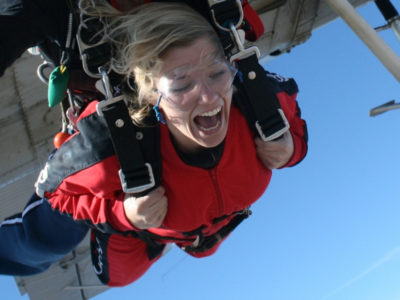Skydiving is more than a once-in-a-lifetime adventure. For a lot of people, jumping out of airplanes becomes a lifestyle and obsession. And, whether you jump one time or 1001 times, there are after-skydiving effects that impact your mind and body long after you land. You might be wondering if skydiving is hard on your body. We all know that skydiving is an incredible, life-changing experience. But what are the negative effects of skydiving?
 It’s hard to believe that anything as fun and exciting as skydiving could harm your body. But do anything enough times, and there are going to be points of wear and tear. Read on to learn about the great things skydiving does for brains and bodies, pain points to watch out for, and how to mitigate any long-term issues associated with jumping out of airplanes.
It’s hard to believe that anything as fun and exciting as skydiving could harm your body. But do anything enough times, and there are going to be points of wear and tear. Read on to learn about the great things skydiving does for brains and bodies, pain points to watch out for, and how to mitigate any long-term issues associated with jumping out of airplanes.
How Does Skydiving Affect the Body?
You might think skydiving, especially tandem skydiving, is like an amusement park ride: just strap in and enjoy the adrenaline. But there’s so much more to it than just falling out of an airplane and being caught by a parachute!
How physically demanding is skydiving? Even on a tandem skydive, you’re an active participant in the jump. Every skydive requires a certain degree of strength, flexibility, and mental awareness. You have to be able to physically participate in every phase of the jump, from freefall to landing.
And experienced skydivers have even more on their shoulders. Carrying around their gear (a solo skydiving rig weighs around 15 pounds, and a tandem rig can weigh up to 50 pounds!), packing their parachute, repeated landings (including the hard ones), all of this and more takes a toll over time.
But skydiving does great things for your body, too! The positive effects of skydiving are life changing and will reverberate through every aspect of your existence.
Positive Effects of Skydiving
 There’s plenty to love about skydiving. Why else would we do it over and over again? And the reasons behind the love fest go far beyond just having fun in the sky. Skydiving can help to improve your overall health and mental well-being.
There’s plenty to love about skydiving. Why else would we do it over and over again? And the reasons behind the love fest go far beyond just having fun in the sky. Skydiving can help to improve your overall health and mental well-being.
It starts in the sky and continues, well, sometimes forever. The adrenaline rush at the moment causes your heart to beat faster, your senses to heighten, and your brain to become hyper-focused. It almost sounds like a mini workout, and no one ever said working out is a bad thing. This extreme presence of mind also shows you just what your brain and body are capable of under stress, which will stick with you in difficult situations after your jump.
Jumping out of an airplane will also increase your self-confidence. If you can overcome the fear of exiting an airplane door mid-flight, you can do anything! You’ll always look back on that moment when you need a little confidence boost and remember that you. did. that.
The body positions and movements required for stable and safe skydives will also help improve your flexibility and muscle awareness. A lot of the positions you’ll find yourself in during the jump are unlike anything you’ve done on the ground, and your body will react to that. You’ll notice that you’re a little more bendy after you land!
Negative Effects of Skydiving
Skydiving is an extreme sport, and that means it takes place in an extreme environment. High speeds, high altitude, and high movement leave some room for things to cause issues. Especially if you are someone with certain health issues.
The pressure changes that come with ascending to and descending from altitude can cause ear and sinus issues, and even more so if you are already experiencing congestion. Skydiving planes aren’t pressurized like passenger jets, and, even if they were, you’re getting out of them and falling toward the Earth anyway. The extreme and fast pressure changes can cause ear and sinus pain, or even more extreme problems like burst eardrums if precautions aren’t taken. Namely: don’t skydive if you have a cold or congestion.
Remember the increased heart rate we mentioned that comes with the adrenaline rush? That’s another opportunity for health risk. A shot of adrenaline like the one that comes with jumping out of an airplane can pose a threat to someone whose heart isn’t healthy enough to deal with the increased stress. Skydiving puts the heart through the ringer, and it’s important to know that your cardiovascular system can handle it.
Back problems can also be exacerbated by certain aspects of the skydive. As anyone with back issues knows, anything, no matter how small, can set off a painful flare-up, but parachute openings and landings tend to be the most risky moments for backs.
Luckily, skydiving gear has evolved quite a bit over the years with constant research and development. Our equipment is always being improved to mitigate risk and reduce injury. Parachutes are specifically designed to open and land smoothly and consistently to minimize the possibility for injury.
Who Should Not Skydive?
Anyone who is experiencing health issues should consult a doctor before taking the leap. But, generally speaking, nasal and head congestion, heart issues, back and neck problems, and pregnancy are all reasons to think twice before making a skydive.
That’s not to say you can’t ever skydive if you have these circumstances. Talking to a health professional is the best way to understand how skydiving will affect your body and make an informed decision about whether or not skydiving is a good idea for you.
Want to feel what it’s like to fly? Come make a jump with us today!
Copyright © 2024, Skydive Monroe, All Rights Reserved.
DropZone Web Design & Marketing by Beyond Marketing, LLC



